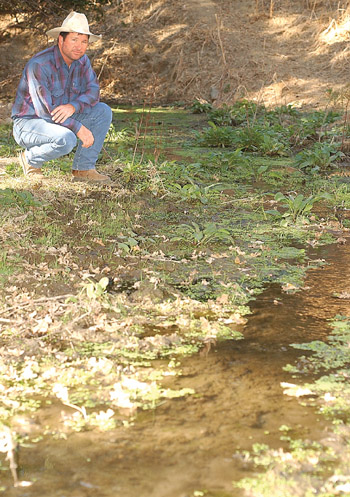
San Benito County farmers knew it was coming
– the required hands-on management of water pollutants. But most
didn’t expect the added burden so soon.
Environmental studies have claimed for years that impacts from
runoff can contaminate streams and groundwater tables. Now all
residents who irrigate in the county must prepare for pending
mandates from the regional water authority
– requirements that will likely oblige constant observation of
potential impacts.
San Benito County farmers knew it was coming – the required hands-on management of water pollutants. But most didn’t expect the added burden so soon.
Environmental studies have claimed for years that impacts from runoff can contaminate streams and groundwater tables. Now all residents who irrigate in the county must prepare for pending mandates from the regional water authority – requirements that will likely oblige constant observation of potential impacts.
That’s a modern reality many local farmers aren’t happy about.
“We didn’t know the elimination of the (wastewater discharge) waiver was going to come so soon,” said Tom Tobias, president of the San Benito County Farm Bureau. “We’re hoping they give us a little more time.”
The state recently passed legislation changing a program originating in 1983 that allowed farmers to be excused from wastewater discharge requirements. In this case, wastewater is defined as any water that enters and leaves someone’s property, Tobias said.
Since that change, the Regional Water Quality Control Board has been working on a program for the six-county area. The deadline for its completion was January 2003, but planning has taken more time than originally allotted because of the region’s wide-variety of interests to please, according to Alison Jones, an environmental scientist for the regional water board.
“I felt it was important to work not only with (farmers), but also to work with the environmental interests to come up with something acceptable to everybody,” said Jones, who mentioned the Monterey Bay National Marine Sanctuary as one highly interested player.
The preferred proposal under consideration would include farmers’ involvement in the management of erosion control, pesticides, herbicides and harmful nutrients, Jones said. That includes high levels of nitrates in streams – caused by use of fertilizer – often two or three times normal drinking water standards, Jones said.
Furthermore, studies show that many of the Central Coast region’s most harmed water bodies and groundwater tables run through agricultural areas, according to a regional water board staff report.
It has not been precisely determined how individual farmers will be involved or what tools will be necessary.
“We have some serious impacts,” Jones said. “We’re trying to make it workable and not put anybody out of business.”
The regional water board held a workshop with farmers on the issue at its latest meeting Oct. 23 in Santa Barbara. And while there is no set deadline for implementation of a final plan, Tobias said farm industry advocates are working to extend the timetable – “to give us more time to get everything worked out.”
While local farmers have professed fear of uncertainty about the changes, Jones emphasized many people have maintained a glaring misconception: The state will not require groundwater monitoring, she said.
For more than a year, the local Farm Bureau has offered educational workshops on the monitoring issue, along with methods to prevent pollutants and erosion, according to Tobias. Most farmers and ranchers, he pointed out, are already environmentalists.
“Most farmers are in that business of eliminating erosion,” he said. “Farmers cannot afford to lose topsoil from erosion.”
Tobias encouraged local residents affected by the upcoming mandates to get involved with the Farm Bureau’s program. Moreover, anyone active in the farm bureaus’ programs throughout the six counties will be included in a more convenient group permitting process. Those not involved will likely be required to obtain discharge permits on their own, Tobias said.
Residents who currently manage levels of pollutants in their discharged water will be eligible for a five-year waiver, Jones said. It would mean once those residents send initial reports, they will get subsequent five-year windows to update the state.
“Farmers are going to have to prove that we’re not the problem,” Tobias said.









